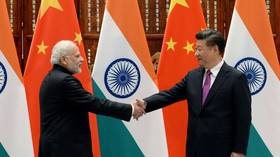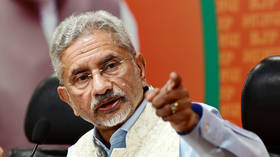World needs peace between India and China – Modi

New Delhi and Beijing must “urgently address” ongoing border disputes and resolve the “abnormality” in their bilateral ties, Indian Prime Minister Narendra Modi has said. Tensions between the two Asian powers have escalated recently over a number of unresolved border disputes.
“Stable and peaceful relations between India and China are important for not just our two countries but the entire region and world,” Modi told Newsweek, adding that “positive and constructive bilateral engagement” could help to restore and sustain “peace and tranquility.”
The two countries share a vaguely defined 3,440km (2,100-mile) border called Line of Actual Control (LAC) in the Himalayan region, where numerous skirmishes have occurred. The latest deadly face-off happened in June 2020, when troops fought without shots being fired – military personnel on both sides do not use firearms under two bilateral agreements signed in 1996 and 2005. The clash resulted in casualties on both sides, with India confirming that 20 people had died, and China revealed a year later that it had lost four soldiers.
The two nations have held more than 20 rounds of border talks since then, with the latest discussions taking place earlier this month. Although these have yielded no major breakthroughs, both countries committed to achieving complete disengagement and resolving the remaining issues. This process began in 2022 but has yet to be completed.
Last year, Modi met Chinese President Xi Jinping on the sidelines of the BRICS summit in Johannesburg, South Africa. At the time, the Indian leader suggested that “maintenance of peace and tranquility in the border areas and observing and respecting the LAC” were considered essential for the normalization of ties.
Modi’s latest remarks come against the backdrop of Beijing’s recent ‘renaming’ of a dozen locations in the Arunachal Pradesh region, which is claimed by both sides. Beijing, which calls the region ‘Zangnan’ had previously released several lists of “standardized names” in Tibetan and pinyin, the Roman alphabet version of Mandarin Chinese – in 2017, 2021, and 2023.
New Delhi described this as “senseless” and reiterated that it sees Arunachal Pradesh as an “integral and inalienable part of India.”
China protested after Modi visited Arunachal Pradesh in March to inaugurate a tunnel built to potentially hasten Indian troop deployments to the border. Beijing also issued a warning to Washington, which waded into the controversy saying that it recognized Arunachal Pradesh as part of India and “strongly opposed” China’s “unilateral attempts to advance territorial claims.”
Beijing responded to the move by asserting that the “China-India boundary question is a matter between the two countries and has nothing to do with the US side.”
Where India Meets Russia – We are now on WhatsApp! Follow and share RT India in English and in Hindi












